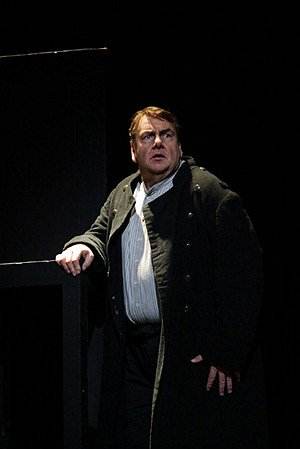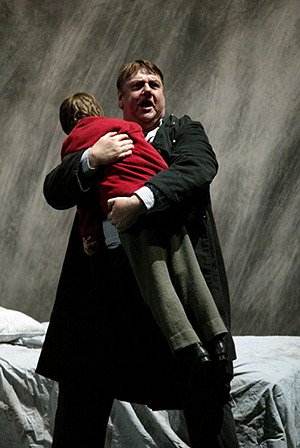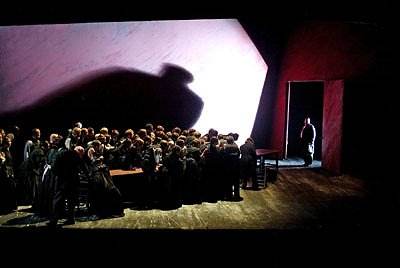| Error processing SSI file |
||||
|
Editor: Marc Bridle
Webmaster: Len Mullenger
|
Seen and Heard Opera Review
Benjamin Britten, Peter Grimes (new production première) soloists, Royal Opera House, Covent Garden, 3rd July 2004 (BK)
Conductor:
Antonio Pappano Designs:
John Macfarlane Concert Master: Vasko Vassilev Cast Ellen
Orford: Janice Watson Although billed as a new production, Covent Garden’s latest Grimes is in fact a revival of Willy Decker’s 1994 staging at La Monnaie, directed this time by François de Carpentries. The production’s principal ‘idea’ is that the opera is about the power of religious bigotry and its effects on a simple but unlucky man. In this representation of The Borough religious allusions are everywhere.
The whole action is larded with religiosity; the chorus sits in gender segregated lines singing literally from hymn sheets, a large crucifix is carried by the lynch mob and the village dance is a Feast of Fools where the men wear pig-face masks and the women dress up in scarlet. To deal with this community, people must either ‘ship in’ or ‘ship out’ completely, as Balstrode and Ellen discover in the end. And when Grimes ships out finally, it is not because he is either a brute or a madman but simply because he can’t stand the gossiping hypocritical religiousness. To hell with all its mercy, he sings at the end of the work, a completely rational sentiment in these circumstances.
Now, the problem with this approach is that much of the of the text’s emotional tension is lost. There’s no need for the audience to work out whether Grimes is a real victim or whether the crowd’s anger towards him is justified because of his behaviour. Everything comes ready-resolved; Grimes isn’t such a bad chap, the production says, it’s just the bigotry that’s wrong. The work’s drama though, depends on there being real doubt about whether Grimes murdered William Spode or not, about whether he is a serial child-beater and about whether or not he is mad. It’s surely about what you would really do if Grimes was your next - door neighbour. You’d move these days, I expect. Well, probably.
Presenting Grimes as a misunderstood and simple man who is merely unfortunate in the place where he chooses to live (even though he might be native, rooted here as he says) also restricts opportunities for vocal characterisation. And while there are some nice touches in the production’s action to show how Grimes isn’t so bad – he doesn’t strike at Ellen when she tackles him about John’s bruises and the boy himself tries to comfort him during the hut scene – Ben Heppner’s vocal portrayal did seem unnecessarily limited in emotional range. Unlike Jon Vickers in the ROH Elijah Moshinsky production, Heppner was never allowed to be particularly angry or (in the end) desperately desperate, so to speak.
Although most of the music was up to the standard that Royal Opera usually provides, some of it also seemed constrained by the production. The chorus for instance, though singing as well as ever, never quite conveyed the raw hostility towards Grimes that might have been expected. Clearly this was not due to Terry Edwards’ training - and it was good to see him on stage with his singers for what might have been the last time before full retirement from the company – but might well have owed something to Antonio Pappano’s conducting which also seemed less assured and dynamic than it often is. It really did seem as though an uneasy tension lay between the needs of the production and the demands of the score for a good deal of the time, although this wouldn’t account fully for some moments of noticeably insecure ensemble here and there.
Restrictions of characterisation apart, Ben Heppner gave a good account of the title role and is clearly recovering well from the vocal problems he had a year or so ago. His voice seems restored now to most of its former glories and for sheer heroic tenor sound Heppner is still hard to beat at his best. The voice is effortlessly strong throughout its compass and although some aspects of Now the Great Bear and the Pleiades seemed to give him a little trouble, his dolcissimo tone for What harbour shelters peace? et seq was well controlled and particularly moving.
Janice Watson, in particularly radiant voice with never a note out of place, made an attractive and young Ellen Orford and Alan Opie was an assured, strong and nicely characterised Balstrode. Jonathan Veira (Hobson) Ian Caley (Boles) and Anne Collins as Auntie were all on good form while Matthew Best’s Swallow, though certainly powerful, was also relentlessly loud.
John Macfarlane’s sets were distinctly minimalist, mostly black with a steeply raking stage and a Turneresque back drop of sea or sky. The stage raked so steeply though that I spent a good deal of time worrying about whether gravity would defeat the cast sooner or later. Just like the South Col it was, as Michael Flanders used to say.
Bill Kenny
Photo Credit: Clive Barda PETER GRIMES by Benjamin Britten, The Royal Opera House, July 2004 BEN HEPPNER as Peter Grimes GABRIEL SASSI MAYORAL GALINDO as apprentice Conductor ANTONIO PAPPANO
Back to the Top Back to the Index Page |
| ||
|
||||





